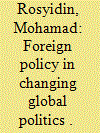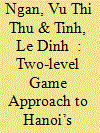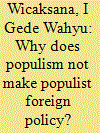| Srl | Item |
| 1 |
ID:
154722


|
|
|
|
|
| Summary/Abstract |
Since President Jokowi came to power in October 2014, Indonesia’s foreign policy has undergone fundamental change, most obviously in the state’s emphasis on domestic priorities rather than global engagement. Although Jokowi’s foreign policy has pursued an ‘active’ principle by participating in many international forums, it seems to have overlooked the changing contexts of the geopolitical turn. Asia has been rising and is becoming the geopolitical center of gravity in the 21st century. Yet, instead of adapting to this shift, Indonesia’s foreign policy continues to neglect the ‘Asian Century’ turn that has been taking place for years. Indonesia should have increased its international profile to enhance its status as a ‘Third Asian Giant’ beside China and India, but Jokowi’s administration has not taken such an opportunity. This article argues that Indonesia is not interested in gaining international status because of the domestically focused nature of its foreign policy. Indonesia is seen as needing to consolidate its own national resilience before asserting itself in a wider international arena. For Jokowi, national interest is defined as material—primarily economic—interest. In addition, Indonesia’s traditional status as a regional, middle level international power prevents the country from seeking any greater global status. This article argues, with optimism, that Indonesia should seek to change this traditional paradigm of middle power status. It suggests that the assertion of global status matters in Indonesia’s foreign policy because the better the country’s position in the international hierarchy of states, the easier it will be for the nation to achieve its own domestic interests.
|
|
|
|
|
|
|
|
|
|
|
|
|
|
|
|
| 2 |
ID:
190076


|
|
|
|
|
| Summary/Abstract |
In this article we elucidate the evolution of Hanoi’s foreign policy proactivism which has been understudied in the contemporary literature. In selective areas, why has Vietnam adopted a more proactive foreign policy than before? By means of ‘two-level game’ theory, official documents and research papers, and expert interviews, we analyze the foreign policy of Vietnam and compare it with that of Indonesia, ASEAN’s de facto leader, by examining the former’s role in the South China Sea issue and international economic integration strategy. In these aspects which Vietnam today has evinced its sectoral leadership, compared to Indonesia, the country has faced fewer constraints in domestic and international strategic environments to exert its diplomatic proactivism.
|
|
|
|
|
|
|
|
|
|
|
|
|
|
|
|
| 3 |
ID:
188428


|
|
|
|
|
| Summary/Abstract |
The consequences of populism on foreign policy have been a rising topic of academic inquiry in recent years. The latest literature exposes diverse propensities in the state governments’ international behaviour led by populist leaders. In comparison, foreign policies of populists in the Americas and Europe exhibit anti-elitism and anti-pluralism toward the outside world. Those in Asia tend to be populist domestically, not in foreign policy. This article focuses on the foreign policies of Asian populist government leaders and addresses the question as to why are their foreign policies sterile from populism? It presents the case of Indonesia under President Joko Widodo (Jokowi). The argument is that the enduring pragmatism and domestic constraints have hindered Jokowi's populist motive from shaping the role of the state foreign policy as the defender of the suppressed people against the repressive elite. Hence, Jokowi is unable to make any substantial change to the foreign policy of his non-populist predecessors, and he has to maintain Indonesia’s traditional foreign policy pillars. Nevertheless, the case of Jokowi's Indonesia can open up the space to challenge the established Euro-American scholarship advancing a positive connection between leaders’ populism and foreign policy.
|
|
|
|
|
|
|
|
|
|
|
|
|
|
|
|